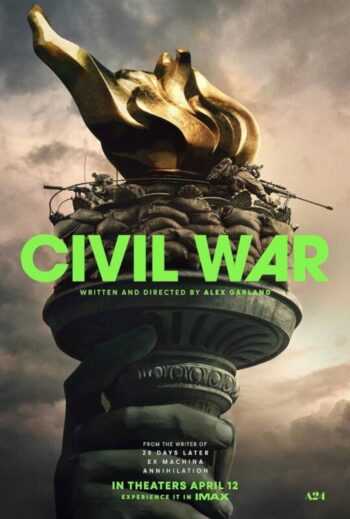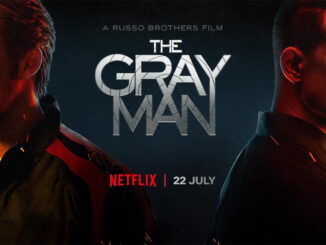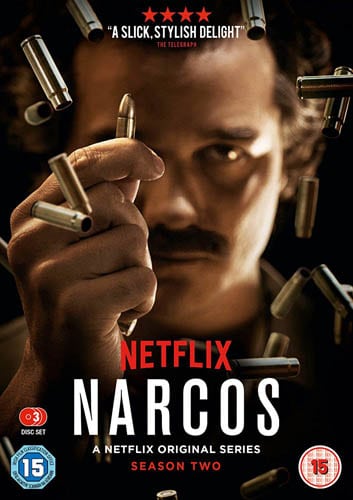Civial War (2024)
Directed by: Alex Garland
Written by: Alex Garland
Starring: Cailee Spaeny, Jesse Plemons, Kirsten Dunst, Stephen McKinley Henderson, Wagner Moura

CIVIL WAR (2024)
Directed by Alex Garland
A tyrannical leader wants to overthrow American democracy, and a highly polarised public is at each other’s throats. Riots and violence are breaking out, and people have lost trust in the system. But enough about the news – let’s focus on Alex Garland’s fourth film. Civil War is the director’s stab at a dystopian thriller, in which an unlikely coalition of armed militants from Texas and California have formed a resurgent movement known as the Western Forces and are closing in on a fascist president. We follow a group of journalists, led by the battle-hardened Lee (Dunst), who want to record the moment and maybe even get a word from the commander-in-chief – assuming he’s still alive. As they make their way from New York to Washington, D.C., they encounter bloodthirsty rebels, corrupt soldiers, and civilians who want to pretend none of it is happening.
Look, I don’t know about you but I hated Men. I found it sanctimonious drivel that got bogged down in a mess of flimsy metaphors that were far less scary than what they were standing in for. As such, I was pleasantly surprised by Civil War’s if anything overly direct approach to its subject matter. At face value, it sounds like a didactic satire on post-Trump America. Viewers may expect a state of the nation piece about the supposedly greatest country in the world falling into armed conflict with itself – for a second time. But Garland isn’t interested in charting the causes of war, which would likely be criticised from all sides, as much as its consequences. Considering the tempestuous nature of American politics at the moment this may sound like a cop-out – hence many are calling it a “centrist dad” film. And yeah, potentially it would have been good to characterise the conflict more. Properties like The Purge and Handmaid’s Tale show how you can create a fictional timeline that plays with contemporary iconography to explore modern society without being bound to it. Yet, following his fairly vacuous comments about it being idiotic to suggest political ideologies equal moral stances (tell that to anyone wanting to protect or even restict rights) I’m quite glad he doesn’t offer more specific commentary. Any concrete backing story he could conceive would eat into the breakneck pace and would likely be criticised on account of seeming unrealistic or naive. Besides, in the same way we don’t need to know how the Inception dream machine works, it isn’t too important that the reasons for the titular war are credible, provided the fallout is.
Civil War skilfully takes something that seems almost abstract, which we’re used to seeing across seas, and plants it somewhere familiar to Western audiences. As we traverse the ravaged lands, Garland knows that there’s something visceral about seeing locations we’d usually associate with news stories, think pieces, and bureaucratic dramas being used as the backdrop for a gritty war film. And what a war film it is! The gunfights are intense, never lapsing into the trap of glorifying the violence or making it look cool. There’s a raw, dirty energy to it, and seeing it through the lens of the photographers who have trained themselves not to ask questions means we’re never really sure who the good guys are. Heck, as we learn in a slightly surreal scene, some of the people fighting don’t even know which side is which. The locations, props, and especially sound design combine to create a chaotic but highly immersive cinema experience that’ll have you ducking for cover or covering your ears as bullets fly overhead. One sequence in particular, where they get up close as militias fight the military, has a Saving Private Ryan quality. Yes this mid-budget film puts most blockbusters to shame – war looks swell. It’s also darn scary, with viewers getting the feeling anyone can die at any time. A scene with the ever-reliable Jesse Plemons is arguably the stand-out and a sure contender for most tense of the year.
But amongst all the explosions and threats, the shock and awe of war is juxtaposed with moments of quiet beauty and contemplation where our journalists contemplate what they do. Historically, I’ve viewed Garland as someone more interested in ideas than people – and to an extent, that’s true here as well. However, the character drama is surprisingly good, and it helps that he ditches his usual cold, detached voice for a warmer tone that’s happy to utilise genre conventions – even if the action elements get a bit far-fetched in the third act. It isn’t exactly a hopeful movie, but it’s rewarding watching Lee gradually taking a shine to newbie Jessie (Spaeny) after years of being broken down by photographing dead bodies. Then there’s the gung-ho Joel (Moura) and the aged Sammy (McKinley Henderson), who provide interesting foils to the two women. The four have great chemistry, giving depth to an often minimalist script. All are shellshocked in their own way, damaged by their time in the field, and it’s interesting to see them wrestle with their professional demands to be objective: they aren’t there to answer ethical questions but to record what’s happening so that others can. Will they learn anything from it? It’s unlikely, and perhaps one implication of Garland’s relatively shallow approach to geopolitics is it emphasises that the obstacle which needs removed isn’t limited to an individual or political party but an innate tendency to see ingroups and outgroups. And like that, he has made his most human film.
Rating: 









Be the first to comment